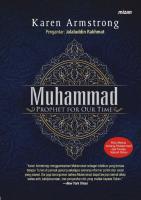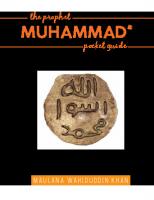Prophet Muhammad: A Man of Peace
145 69
English Pages [12]
A Man of Peace Booklet (Revised)
A Man of Peace Booklet
New Cover Page
Booklet
2
3
4
5
6
7
8
9
Page 10
A Man of Peace Booklet (Revised)
A Man of Peace Booklet
Booklet
11
Page 12 - Back Cover
Recommend Papers
File loading please wait...
Citation preview
PROPHET MUHAMMAD A MAN OF PEACE by Maulana Wahiduddin Khan Padma Vibhushan Awardee World-renowned Islamic Scholar Gandhian Peace Activist
FOREWORD Due to the intolerance and violent extremism of small groups of people who call themselves ‘Muslims’, Islam is currently widely perceived to be a religion of violence. These groups assert that their objectives can be achieved only through a violent approach. This, however, is untrue. Islam is not the name given to the behaviour or the actions of a particular group of people who call themselves ‘Muslims’. Islam is a system of beliefs and ethics; people who hold those beliefs and value those ethics are called Muslims. It follows, then, that the behaviour of Muslims must be judged by the principles of Islam and not vice versa. Islam cannot be evaluated based on the actions of Muslims. If individuals calling themselves ‘Muslims’ adopt violent means, then the responsibility for their actions lies with them, not with the religion they profess. In spite of their professed Islamic agenda, the actions of such people cannot be deemed Islamic.
PEACE IN ISLAM Islam is derived from the Arabic root word ‘Silm’. The root word Islam implies peace. All the teachings of Islam are based directly or indirectly on this principle. The Prophet Muhammad’s teachings say ‘Peace is Islam’ and ‘God is peace’ (Al-Bukhari). Similarly, there is another Hadith (the teachings and sayings of Prophet Muhammad) that says that a Muslim is one from whose tongue and hands, people are safe. One of the attributes of God described in the Quran is ‘As-Salaam’, which means ‘peace and security’. It means that God is a manifestation or embodiment of peace. In the Quran, divine guidance is likened to the ‘path of peace’.(5: 16) Islam and almost all other religions make Paradise the eternal ideal and the ultimate objective of every human. The Quran calls Paradise the ‘Home of Peace’.(10: 25) It is also said that the people of Paradise would wish peace for one another, which indicates importance of peace in the ideal society.
Peace is the norm in Islam; war is the exception. All the teachings of Islam and the life of the Prophet of Islam testify to this. For example, a Hadith says that God grants to gentleness what He does not grant to harshness. That is to say, a peaceful approach is distinctly superior to violence.
PEACE IN THE QURAN The Quran is undoubtedly a book of peace. It is not a book of war and violence. This can be seen from the fact that all of the Quran’s pronouncements are directly or indirectly related to peace. Its opening invocation is — “In the name of God, the Most Beneficent, the Most Merciful”, and this verse is repeated in the Quran 114 times. This is an indication that the greatest attribute of the Supreme Being who sent this book to us is His mercy. We could say that the theme of this entire book is God’s all-embracing compassion. Judging by its consequences, the way of peace is far better than confrontation or conflict. According to the law of God for humankind, God has decreed success only through reconciliation, and not through violent courses of action. The Prophet’s wife Aisha said that the Prophet’s general policy was always to choose the easier path (Al-Bukhari). The non-confrontational approach is undoubtedly the easier approach than the confrontational approach. This means countering aggression with aggression is a hard option and countering aggression with patience and forbearance is an easier option, radicalism is harder than gradualism. Therefore, peace is always the easier option in achieving the desired results.
PROPHET A MAN OF PEACE Islam is the name of the revealed religion professed by the Prophet Muhammad and exemplified in his life. The Prophet Muhammad was a prophet of peace, not a prophet of violence. In the Quran, he is called a ‘mercy to humankind’.
He was a peace-loving personality in the complete sense. His peace-loving nature was so heightened that he did not even like to hear a child being named Harab which meant war and guided the parents to change it to Hasan which meant goodness. He believed in cultivating a peaceful character. He wanted his followers to do good works for the people, giving them the message of peace and prosperity, and not of death and destruction.
MILITARY ACTIVITIES UNDER THE PROPHET’S LEADERSHIP The battles that took place during his life were only incidental and under exceptional circumstances. Therefore, these battles do not constitute the main feature of his life. However, most of the Prophet’s biographers have painted an altogether different picture of him. Instead of presenting him as a prophet of peace, they have portrayed him as a prophet of violence. The battles fought during the Prophet’s time were related to the culture prevailing amongst the Arab tribes. Before the Prophet’s birth, there was an ongoing conflict between two major tribes of Madinah, It is said that this war continued for 120 years and thousands of people perished in these battles, the prominent one of which was known by the name of the Battle of Buath. (Biography of the Prophet by Ibn Ishaq) The Prophet Muhammad was born when Arabia was divided by many different tribes, with several clans, all vying for domination. Fights between tribes and clans over trivial issues were common. Due to this culture, there were skirmishes between the Prophet’s followers and their opponents. However, most of the incidents that the biographers of the Prophet have presented as battles can be better classified as minor skirmishes instead. He began his mission of conveying God’s guidance to humankind in a peaceful manner. There was never any act of violence by the Prophet against those who objected to his teachings or oppressed him and his followers during the entire thirteen years of his life as a prophet in Makkah. While he was in Makkah, his teachings were always those of patience, tolerance and avoidance.
The Prophet and his followers had to face the hardships of a three-year social boycott by the tribe, and they faced this patiently enduring their difficulties. When his opponents plotted to kill him, he quietly escaped from Makkah with a few of his Companions to Madinah. He gave the same advice to his followers. Even in Madinah, his opponents did not leave the Prophet and his followers in peace. They did everything possible to make life miserable for them. At such a time the following verse was revealed. Will you not fight against those who have broken their oaths and conspired to banish the Messenger? They were the first to attack you. Do you fear them? Surely God is more deserving of your fear if you are true believers. (9: 13) This verse permitted the believers to fight. This permission was conditional. The condition was to fight when attacked. These hostilities resulted in the two battles of Badr and Uhud. After these battles when the Prophet got to know that his opponents were marching towards Madinah with an army of 10,000, he employed a strategy of avoidance by creating a trench outside Madinah. Because of this strategy, an armed conflict was averted.
THE MISSION OF THE PROPHET The Prophet was on a divine mission to present God’s message to humankind. Any mission of communication can only be successful when the circumstances are harmonious and peaceful. For an atmosphere of peace, though, a price has to be paid, and that was in the form of perseverance in the face of all obstacles; ignoring the problems while making use of the opportunities. The Prophet’s opponents were constantly provoking him and his followers to engage with them in battle over small issues, but the Prophet and his Companions always chose the divine teachings of patience and forbearance to circumvent confrontation. The Quran says: Whenever they kindle the fire of war, God puts it out...(5: 64)
Further, we have the example of the Treaty of Hudaibiya where the Prophet accepted all the conditions of the opponents. This treaty was broken by the opponents which resulted in their surrender. Nevertheless, despite their atrocities, the Prophet did not even allow them to be insulted and, instead, announced a general pardon in the following words: “Go, you are free”.
THE TRUE PERSPECTIVE If we were to objectively study the entire 23 years of prophetic life, it would be absolutely clear that he was a prophet of peace. If we compare the Prophet’s battles with other battles in history, we will find that the mission of the Prophet was nonviolent; the battles that happened were defensive in nature and under exceptional circumstances. The number of people killed in these battles was very few when compared to the casualties of many other historical battles. Battle / War World War II American Civil War Battle of Panipat Gulf War Iraq War Battles of Badr, Uhud and Hunain combined
Period
Duration
1939 – 1945
6 years
1861 – 1865
4 years
14 Jan 1761
1 day
Over 100,000
7 months
25,000
8 ½ years
35,000
1 ½ Days
1018
Aug 1990 – Feb 1991 Mar 2003 – Dec 2011 13 March 624, 23 March 625, January 630
Casualties About 65 million About 500,000
Compared to the given sampling of historical battles, the defensive battles fought by the Prophet were those at Badr, Uhud and Hunain. The total duration of the actual fighting was equivalent to only 1½ days. The total number of casualties in all these battles was 1018. Because of a lack of objective understanding of the Prophet’s life, Muslim biographers misrepresented the facts by ignoring the prevailing customs and culture of the time. Due to this, their writings about the Prophet’s life show a war-like pattern. On the other hand, non-Muslim biographers of the Prophet have adopted a different approach. These biographers have largely ignored the main events of the Prophet’s life. They chose to focus on a few, exceptional incidents. As a result have painted a picture of the Prophet’s life that portrays him as a warrior prophet. They have also been unable to see the Prophet’s life as different from Muslim culture, which has led them to assume that terrorism in the name of Islam is an outcome of the teachings of the Prophet of Islam. The truly modest personality of the Prophet appeared to many of his biographers as lacklustre in some way or the other. This image of the Prophet appeared to them as falling short of the standards of leaders of other peoples of the time, who were great conquerors and warriors. Hence these biographers tried to present an image of their Prophet as a warrior, which, in their eyes, was a superior image. However, this picture of the Prophet is baseless and self-assumed. In truth, the Prophet was a peace-loving personality. The example of the Prophet was not one of overpowering people by fighting them; rather it was by winning the people over with love and compassion. His message was intended to infuse his listeners with a new life. The Quran says: Believers, obey God and His Messenger when he calls you to that which gives you life. (8: 24)
It is obvious from an understanding of the Quran that the mission of the Prophet was different from that of emperors and kings. The mission of kings is one of conquests and wars. However, on the other hand, the mission of a prophet is not to rule over people, but to change their minds and direct their hearts towards spirituality; to teach them God-oriented living thereby making them divine personalities. From the above analysis, it should be obvious that the Prophet Muhammad was a prophet of peace, and not a prophet of violence. The approach to the biography of the Prophet by both Muslim and other biographers is therefore not correct.
AFTERWORD We would like to conclude this study with the views of scholars about the Prophet Muhammad from across the globe. Sir George Bernard Shaw: I have studied him (the Prophet) -the wonderful man, and in my opinion, (…), he must be called the saviour of humanity. Mahatma Gandhi: I wanted to know the best of the life of one who holds today an undisputed sway over the hearts of millions of mankind. I became more than ever convinced that it was not the sword that won a place for Islam in those days in the scheme of life. It was the rigid simplicity, the utter self-effacement of the Prophet, the scrupulous regard for pledges, his intense devotion to his friends and followers, his intrepidity, his fearlessness and his absolute trust in God that surmounted every obstacle. Edward Gibbon and Simon Oakley: The greatest success of Mohammad’s life was effected by sheer moral force. Alphonse de La Martaine: If greatness of purpose, smallness of means, and astonishing results are the three criteria of a human genius, who could dare compare any great man in history with Muhammad?
Michael Hart: My choice of Muhammad to lead the list of the world’s most influential persons may surprise some readers and may be questioned by others, but he was the only man in history who was supremely successful on both the secular and religious levels. Annie Besant: It is impossible for anyone who studies the life and character of the great Prophet of Arabia, who knows how he taught and lived, to feel anything but reverence for that mighty Prophet, one of the great messengers of the Supreme. Moreover, although in what I put to you I shall say many things which may be familiar to many, I feel a new way of admiration, a new sense of reverence for that mighty Arabian teacher whenever I re-read them. Diwan Chand Sharma: Muhammad was the soul of kindness, and his influence was felt and never forgotten by those around him. To watch a video lecture on this topic, kindly visit the link: https://www.youtube.com/watch?v=z0RvkPqrZ5Y Further Reading: The Prophet of Peace by Maulana Wahiduddin Khan (Penguin Books) available on www.goodwordbooks.com Related Article: https://www.speakingtree.in/article/ end-misunderstandings-through-sound-arguments
We, the ambassadors of peace of CPS International founded by Maulana Wahiduddin Khan, are into the peace mission of the Prophet. Maulana Wahiddudin Khan, the recipient of many peace awards the latest being the Padma Vibhushan the second highest civilian award, who passed away in 2021 dedicated his life, his resources to this cause. He worked tirelessly towards re-engineering the minds of the people towards peace & positivity. He says ‘Terrorism is an ideology of violence and we have to counter it with the ideology of peace’.
Maulana presents the true face of Islam, Islam as it is, i.e. a religion of nature. For answers to questions about Islam and further reading kindly go through our websites: www.cpsglobal.org www.facebook.com/maulanawkhan www.spiritofislam.co.in www.peacemission.in
MAULANA’S LAST WORDS “The greatest success in this world is to live life in such a manner that you should not have an iota of negative thought against any person. You should depart from this world with a totally positive mindset. This is my last discovery in this world.” -Maulana Wahiduddin Khan (1925-2021)
FOR FREE DISTRIBUTION NOT FOR SALE









